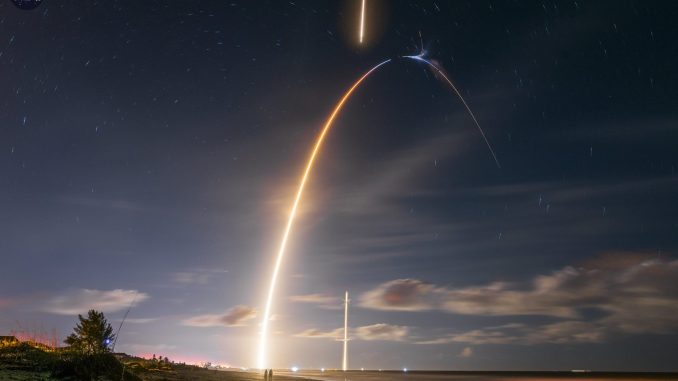
SpaceX lofted the super-secret Zuma spacecraft for the U.S. government tonight (Jan. 7), successfully executing a mission that also featured yet another landing by the first stage of the company’s Falcon 9 rocket.
The Falcon 9 lifted off at 8 p.m. EST (0100 GMT on Jan. 8) from Cape Canaveral Air Force Station, on Florida’s Space Coast.
The booster’s two stages separated 2 minutes and 19 seconds into flight. The second stage continued carrying the mysterious Zuma to its destination in low-Earth orbit (LEO), while the first stage began maneuvering its way back to terra firma for a touchdown at Landing Zone 1, a SpaceX facility at Cape Canaveral. [How SpaceX Lands Falcon 9 Rockets]
The first stage aced that landing, a little less than 8 minutes after taking off.

Credit: SpaceX
SpaceX now has 21 successful first-stage touchdowns under its belt, nine of them at Landing Zone 1 and the other 12 on “autonomous spaceport droneships” stationed in the ocean. (SpaceX has two of these uncrewed vessels, which are named “Just Read the Instructions” and “Of Course I Still Love You.”)
These landings are part of SpaceX’s effort to develop fully reusable rockets and spacecraft — technology that company founder and CEO Elon Musk has said will slash the cost of spaceflight. To date, SpaceX has re-flown five of these landed boosters, as well as two of its uncrewed Dragon cargo capsules, which make resupply runs to the International Space Station. (The Falcon 9 that lifted off tonight was brand-new.)
But the main goal of tonight’s flight was getting Zuma aloft, so the spacecraft can start going about its business. Just what that business may be is unclear; little has been revealed about the payload.
We do know that aerospace and defense company Northrop Grumman procured Zuma’s launch atop a Falcon 9 for the U.S. government — but we don’t know which agency will operate the satellite, or if its mission is civilian or military.
If Zuma is a national-security mission, it wouldn’t be the first one that SpaceX has launched. Falcon 9s also launched a satellite for the National Reconnaissance Office in May 2017 and the Air Force’s robotic X-37B space plane this past September.
The Zuma mission was originally supposed to launch in mid-November, but SpaceX stood down for a while to study data from payload-fairing test performed for another customer. (The payload fairing is the protective nose cone that encases a spacecraft during launch.)
| [adrotate group=”4″] |
[adrotate banner=”24″]

[pt_view id=”517b65fj16″]


Be the first to comment